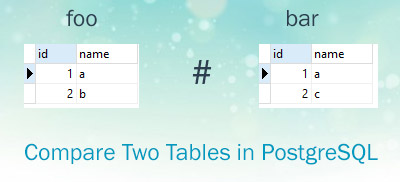September 14, 2023
Summary: in this tutorial, you will learn various ways to compare two tables in PostgreSQL.
There are several ways to compare the content of two tables to find the differences between them. We will show you two commonly used techniques to compare data of two tables.
Compare two tables using EXCEPT and UNION operators
First, let’s create two tables named foo and bar, and insert some sample data for the demonstration.
CREATE TABLE foo (
ID INT PRIMARY KEY,
NAME VARCHAR (50)
);
INSERT INTO foo (ID, NAME)
VALUES
(1, 'a'),
(2, 'b');
CREATE TABLE bar (
ID INT PRIMARY KEY,
NAME VARCHAR (50)
);
INSERT INTO bar (ID, NAME)
VALUES
(1, 'a'),
(2, 'b');
The foo table has the same structure and data as the bar table.
Next, we update one row in the bar table.
UPDATE bar
SET name = 'c'
WHERE
id = 2;

Then, to find the rows in the foo table but not in the bar table, we use the following query:
SELECT
ID,
NAME,
'not in bar' AS note
FROM
foo
EXCEPT
SELECT
ID,
NAME,
'not in bar' AS note
FROM
bar

We used EXCEPT operator that returns the rows in the foo table but not in the bar table. We can apply the same technique to find the rows that are in the bar table but not in the foo table.
SELECT
ID,
NAME,
'not in foo' AS note
FROM
bar
EXCEPT
SELECT
ID,
NAME,
'not in foo' AS note
FROM
foo

Finally, we use UNION operator to combine the result of both queries to find:
- Rows in the
bartable but not in thefootable. - Rows in the
footable but not in thebartable.

Compare two tables using OUTER JOIN
We can use the outer join to compare two tables as follows:
SELECT
id,
name
FROM
foo
FULL OUTER JOIN bar USING (id, name)
WHERE
foo.id IS NULL
OR bar.id IS NULL;
It returns the differences between two tables:

To find the number of rows that are in the foo table but not bar table and vice versa, we use the COUNT function as follows:
SELECT
COUNT (*)
FROM
foo
FULL OUTER JOIN bar USING (id, name)
WHERE
foo.id IS NULL
OR bar.id IS NULL;

In this tutorial, we have shown you two ways to compare two tables in PostgreSQL.

